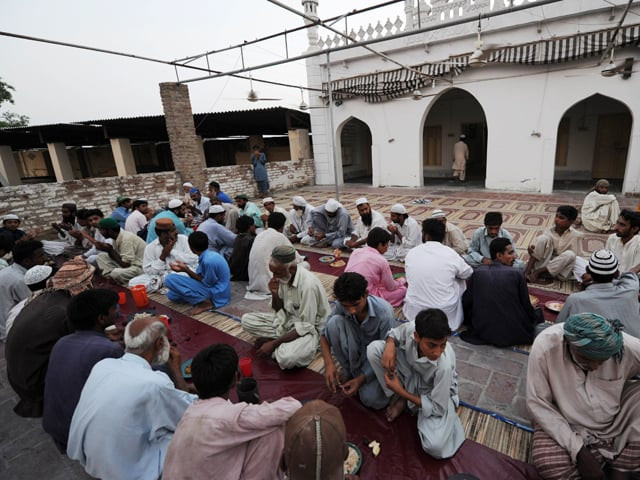Campers willing to starve if rice is all they get
The first day of Ramazan tested the endurance of relief workers and flood survivors across the province.

Campers willing to starve if rice is all they get
A meeting was held at the district management cell under Nafisa Shah, who sat down with the EDOs, NGOs as well as the UN delegations to devise a strategy to help the flood survivors. It was decided that a 24- to 48-hour exercise will be carried out to survey the areas and gather data regarding what needs to be done, after which each NGO will pick a camp and run it with the support of the UN as well as the government. The meeting decided that the NGOs will be responsible or the food, as well as the health and hygiene efforts at their camps.
Meanwhile, villagers at a relief camp, set up near the Ramazan Brohi belt that lies around one-and-a-half kilometres away from the river embankment, complained of diarrhoea and other food-related diseases, adding that though they had been rescued, their lives were not much better.
The camp, housing around 5,500 people, doesn’t have any kind of shelter against the elements and people are forced to sleep under the skies.
These camps are unmonitored and the food for the survivors comes from a contract-based supplier, hired by the district government which is responsible for the distribution of food.
Despite having been rescued by the navy officials two days ago, Do Sali and his family said that they had yet to be provided with proper shelter and that the rice they were given twice a day - dubbed as “meals” - smelt bad.
“We will starve, but we will not eat this rice,” said villagers who insisted that the crop had gone bad, something officials and volunteers around the camp confirmed.
“We tried to eat it but it truly smells bad. I wouldn’t touch it,” said a volunteer.
However, officials at the Mahesar school, which is currently acting as another relief camp in the area, said that the problem did not lie with the rice. Instead, the villagers are hoping to get their diet changed by complaining because they are sick of eating the same thing every day, they added.
Meanwhile, there appears to be a Good Samaritan in the area who has heard the pleas of the villagers and is trying to ensure that they are provided with food. Abdul Hameer Narejo, a local from the area, which belongs to the Pagara tribe, said that the chief of the community had asked his tribesmen to distribute food in the area no matter what the government is doing about the situation.
It appears that the government as well as the NGOs are playing a game with the flood survivors, according to sources, who claimed that officials from these NGOs could only be seen during visits by ministers and other VIPs.
“They look busy when the chief of naval staff or the ministers come, but disappear when the official visits are over,” they added.
Mohammad Ramazan, a resident of the Mor Ghabar Shaikh village, who arrived at the camp with eight others from his village, said that many people have been forced to initiate evacuation by themselves as the navy had refused to transport them to the embankments with their belongings.
“No one was giving us boats to move with our things. Officials from the navy said that they will take us across, but not with our things, so we had no choice but to help ourselves,” said Ramazan, who swam to the camp with some villagers who wanted to take their belongings with them.
However, in the middle of all these problems, a woman, identified as Fatima Abro from the Soomar Mala village, gave birth to baby girl with the help of a midwife at the camp. Both mother and daughter are believed to be in a stable condition.
Published in The Express Tribune, August 13th, 2010.



















COMMENTS
Comments are moderated and generally will be posted if they are on-topic and not abusive.
For more information, please see our Comments FAQ